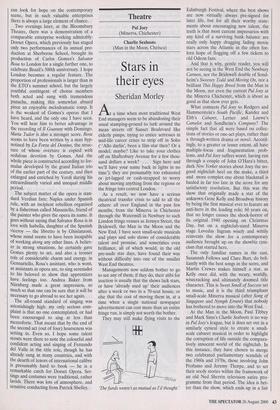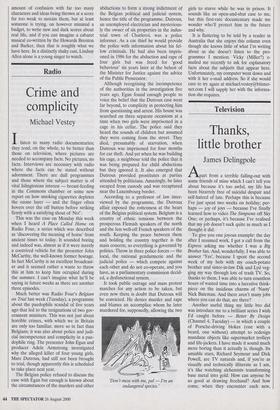Theatre
Pal Joey (Minerva, Chichester) Charlie Sexboots (Man in the Moon, Chelsea)
Stars in their eyes
Sheridan Morley
Aa time when most traditional West End managers seem to be abandoning their usual stamping-ground to lurk around the mean streets off Sunset Boulevard like elderly pimps, trying to entice actresses in mid-life career crises to strip off in Soho ("Allo darlin', been a film star then? Or a model, maybe? Like to take your clothes off on Shaftesbury Avenue for a few thou- sand dollars a week? . . . Sign here and we'll have your name back in lights in no time'), they are presumably too exhausted or jet-lagged or cash-strapped to worry about moving anything from the regions or the fringe into central London.
As a result, we now have a serious theatrical transfer crisis to add to all the others: all over England in the past few months, from the Minerva in Chichester through the Watermill in Newbury to such London fringe venues as Jermyn Street, the Bridewell, the Man in the Moon and the New End, I have seen small-scale musicals and plays and solo shows of considerable talent and promise, and sometimes even brilliance, all of which would, in the old pre-nude star days, have found their way without difficulty into one of the smaller West End theatres.
Managements now seldom bother to go to see any of them; if they do, their alibi for inaction is usually that the shows lack stars, or have 'already used up' their audiences after a week or two in a 70-seat house, or else that the cost of moving them in, at a time when a single national newspaper advertisement can cost more than an entire fringe run, is simply not worth the bother.
They may still make flying visits to the The funds weren't as mutual as I'd thought.' Edinburgh Festival, where the best shows are now virtually always pre-signed for later life, but for all their worthy state- ments about encouraging new talent, the truth is that most current impresarios with any kind of a surviving bank balance are really only happy dragging fading movie stars across the Atlantic in the often for- lorn hope of flogging off a few tickets to old Odeon fans.
And that is why, gentle reader, you will not be seeing in the West End the Newbury Carmen, nor the Bridewell double of Sond- heim's Sweeney Todd and Moving On, nor a brilliant This Happy Breed from the Man in the Moon, nor even the current Pal Joey at the Minerva Chichester, which is about as good as that show ever gets.
What connects Pal Joey to Rodgers and Hammerstein's South Pacific, Kander and Ebb's Cabaret, Lerner and Loewe's Camelot and Sondheim's Company? The simple fact that all were based on collec- tions of stories or one-act plays, rather than a through-written drama or novel. Accord- ingly, to a greater or lesser extent, all have multiple-focus and fragmentation prob- lems, and Pal Joey suffers worst: having run through a couple of John O'Hara's bitter, dark New Yorker stories about Joey the no- good nightclub heel on the make, a third and more complex one about blackmail is hauled in far too late in the score for any satisfactory resolution. But this was the show that originally made a star of the unknown Gene Kelly and Broadway history by being the first musical ever to feature an anti-hero in the leading role; 60 years on, that no longer causes the shock-horror of its original 1940 opening on Christmas Day, but on a nightclub-sized Minerva stage Loveday Ingram wisely and wittily reinvents the show for a contemporary audience brought up on the showbiz cyni- cism that started here.
The only familiar names in the cast, Susannah Fellows and Clare Burt, do bril- liantly with the best songs in the score, and Martin Crewes makes himself a star, as Kelly once did, with the weary, worldly, wisecracking and ultimately doomed title character. This is Sweet Smell of Success set to music, and it is the third triumphant small-scale Minerva musical (after Song of Singapore and Nymph Errant) that nobody has bothered to move into the West End.
At the Man in the Moon, Paul Tibbey and Mark Sims's Charlie Sexboots is no way in Pal Joey's league, but it does set out in a similarly cynical style to create a small- scale cabaret musical in order to highlight the corruption of life outside the compara- tively innocent world of the nightclub. In this instance, they have chosen to merge two celebrated parliamentary scandals of the 1960s and 1970s, those involving John Profumo and Jeremy Thorpe, and to set their seedy stories within the framework of an old Ned Sherrin television satire pro- gramme from that period. The idea is bet- ter than the show, which ends up in a fair amount of confusion with far too many characters and ideas being thrown at a score far too weak to sustain them, but at least someone is trying, on however minimal a budget, to write new and dark scores about real life, and if you can imagine a cabaret musical co-written by the Howards Brenton and Barker, then that is roughly what we have here. In a distinctly shaky cast, Lindsay Allen alone is a young singer to watch.



























































 Previous page
Previous page